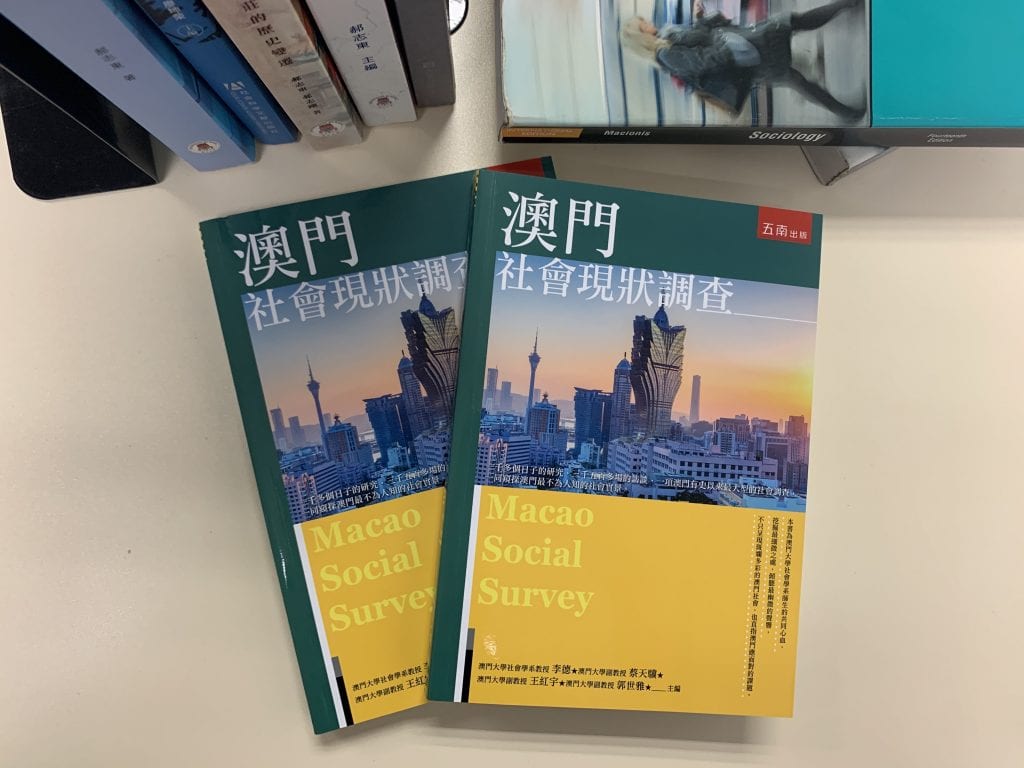The Department of Sociology of the University of Macau recently completed a large-scale household survey in Macao. The results of the survey have been published into a book titled ‘Macao Social Survey’. Conducted over a period of five years, the study included sample surveys among, as well as interviews with, Macao residents. The study is expected to help people better understand Macao’s social development and changes.
Department of Sociology Professor Spencer De Li was the principal investigator of the study while Associate Professor Wang Hongyu, Cai Tianji, and Kuo Shih-Ya served as co-principal investigators. A number of other professors and postgraduate students in the department also participated in the study as members of the research team. From research design that began in 2015 to the eventual publication of the book, the study took nearly five years to complete. Using a multistage stratified cluster systematic sampling method with probability proportional to size, the research team drew a sample of more than 2,600 households and interviewed over 3,500 Macao residents aged 16 or above in the households. The survey covered a variety of topics, including social stratification, migration, family transformation, social identity, physical and mental health, values and norms, addiction and crime, and the influences of gaming and tourism.
Based on an analysis of the survey data, the study has yielded the following major findings: First, Macao is overall a prosperous and wealthy society with stable families. Macao residents are generally in good physical and mental health with an improving level of education. Second, a high percentage of Macao residents is composed of migrants and migrant workers who mostly came from mainland China to reunite with their families or to seek employment. Third, Macao residents report strong identification with mainland China. Most of them see themselves as both Macanese and Chinese. Fourth, multiculturism is prevalent in the faith and value systems among Macao residents. Most residents show an open and tolerant attitude and support gender equity. However, a small percentage of the population displays a conservative attitude, harbours prejudice against marginalised groups, and opposes gender equity. Fifth, the existence of various associations as political channels is a unique feature of the political system in Macao. Many residents actively participate in the election of members of the Legislative Assembly and express their opinions and demands to the appropriate government departments through consultation with these associations and the media, among other channels. Sixth, crime and delinquency remains at a relatively low level. Although Macao is the gaming centre of the world, gambling participation rate is relatively low among local residents, as is the rate of substance abuse. The main problems discovered through the survey include a lack of transport resources, the city’s heavy economic reliance on a single industry, and the overall lower educational level of Macao residents as compared to what is commonly observed in other developed regions of the world.
In the past, all the areas in the Greater China region have conducted population-based large-scale social surveys on an ongoing basis with the only exception of Macao. For instance, there were China Family Panel Studies in mainland China, Taiwan Social Change Survey in Taiwan, and Hong Kong Panel Studies of Social Dynamics in Hong Kong. The lack of a large-scale representative survey has significantly limited people’s understanding of problems in the Macao society as social indicators commonly found in other areas of the Greater China region were not available in Macao. To a large extent, this survey has filled the gap in the field of Macao studies. In order to gain a better understanding of Macao’s social development and changes, the research team will continue to conduct follow-up surveys among local residents who have participated in the baseline survey and will continue to collect data related to the key social indicators. The study was funded by the University of Macau (File No: MYRG2015-00116-FSS).
澳門大學社會科學學院社會學系完成的一項大型澳門社會入戶調查,獲出版名爲《澳門社會現狀調查》的專著。該調查研究歷經五年時間進行抽樣調查以及訪談,結果有助更好地了解澳門社會的發展和變化。
該專著由澳大社會學系教授李德主編,該系副教授王紅宇、蔡天驥和郭世雅為副編輯,聯同社會學系的其他教授以及眾多博士生和碩士生合力完成。該研究從2015年開始設計到專著出版,前後共花了近五年的時間。研究人員通過多階段分層聚類概率比例的抽樣方法,在全澳抽選的2600多家住戶,對其中3500多名16歲以上的居民進行了面談。調查的内容涵蓋了澳門社會的諸多方面,包括社會分層、移民、家庭轉型、身份認同、生理與心理健康、價值觀念、成癮和犯罪行爲、以及博彩和旅遊業的影響等。
專著通過對實證數據的分析得出了以下結論。第一、澳門總體上是一個繁榮富裕的社會,家庭生活相對穩定,居民身心健康良好,教育水平在不斷提高。第二、澳門人口中的移民和移工佔很高比例,移民主要來自中國大陸,遷移途徑以家庭團聚和來澳門工作爲主。第三、澳門居民在身份認同方面有很强的國家歸屬感,多數人認為自己既是澳門人又是中國人。第四、澳門人的信仰和價值觀念呈現多元化特徵,大多數居民思想開放、包容大度、支持男女平等的價值觀念,但也有少數人觀念保守、對社會邊緣化群體持有偏見、對男女平等表示異議。第五、社團政治是澳門政治體制的一大特色,很多居民積極參與投票選舉澳門立法會議員,也通過社團諮詢、媒體等方式把自己的意見和要求反映給相關政府部門。第六、澳門居民的犯罪和越軌行為都比較低,參加賭博的比率不是很高。另外,藥物濫用的比例也處於相對較低的水平。研究中發現的社會問題主要包括公共交通資源缺乏、産業結構單一、貧富分化、以及全民教育程度尚未達到世界發達地區水平等。
除澳門之外,中國社會的其他地區均有基於人群的大型縱向社會調查,如内地的《中國家庭追蹤調查》,台灣的《台灣社會變遷變化調查》以及香港的《香港社會動態追蹤調查》。由於缺乏具有代表性的社會調查研究,澳門許多社會問題都未能完整地呈現,在兩岸四地其他地區經常使用的社會指標也無法得以創建,是次研究很大程度上彌補了澳門研究中的這一缺失。爲了能夠更好地了解澳門社會的發展和變化,研究團隊計劃對參與首次訪談的居民進行追蹤調查,繼續收集與核心社會指標相關的數據和資料。是次研究獲澳門大學資助(檔案編號:MYRG2015-00116-FSS)


